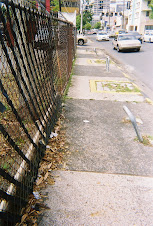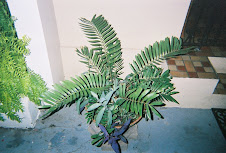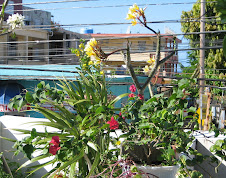The term has a few definitions. You pick. I mean a state of mind fossil like, always the same, blindfolded. Evidence that history, the study of it, is a waste of time since every
mistake I can think of, has been repeated all over the world regarding any possible issue, problem, difficulty. It goes beyond air, water, soil.. for now I will stick to insects.
However, the simplicity of understanding the WHOLE, does not require a rocket science education. That is what irritates me. It keeps yours truly in a constant cranky philosophical attitude, seldom mitigated. Stupidity rules!
FROM
Bugs Of The World
by George C. McGavin
Cassell plc, London
pages 180-181
PLANT FEEDERS
Bugs Of The World
by George C. McGavin
Cassell plc, London
pages 180-181
PLANT FEEDERS
The world's human food production is based on a mere handful of plant species.
Many are grasses, grown in vast uniform stands, (monocultures) and, in developed
countries, largely sustained through the use of huge quantities of fertilizers and pesticides. The domestication and improvement of these species has in many cases
led to their becoming a better nutritional resource (for both human and insects), but
with fewer chemical and physical defences against herbivores. Monocultures contain far fewer beneficial insect species, which might control the number of pests, than are present in more complex habitat.
Phytophagous insects in general and many bug species in particular are superbly suited to using these crops as food plants Many bug species only became pests when
their preferred food plant suddenly became abundant, and many others have switched from wild plant species to cultivated ones. On account of their phenomenal
reproductive powers, pest like aphids and scale insects can adapt very quickly to take advantage of new opportunities and develop resistance to man-made insecticides. It is therefore not surprising that nearly one fifth of the world's crop production is eaten by insects.
In the Hemiptera, all the sterrnorrhynchan superfamilies, the Psylloidea, Aleyrodoidea, Adelgoidea, Aphidoidea and Coccoidea, contain notable plant
damaging species. While the worldwide economic damage and losses that plant
feeding bugs can cause is immense, the vast majority of species are not pests. Of the several hundred of aphid, probably no more than 150 are notorious crop pests. Similarly, of the 2,500 known species of armoured scale insects (Diaspididae) in
the world, fewer than 150 are of economic significance and of these perhaps fewer
than 50 could be called serious pests.
That being written you may take a look at your garden/indoor plants and see if the insect families causing most of the problems in your installation are mentioned above. That proves
my contention about gardens with common place nursery offerings, palms and hedges. YOU
will have to deal with similar problems.
This will bring your humble servant to the following issue. Trans genetics....They were created by the friendly people of Monsanto and five/six other kind scientists, thinking not on PROFITS, but our well being.
The story was to implant resistant genes to specific diseases from lets say, peppers,
to tomatoes. But the real intention is to destroy the seed banks that generations of
farmers around the world had kept within their families, to impose/sell/license seeds
of whatever one can think of. Destroying in the process the independence these
traditional farmers had, with their own seeds, resistant to their particular soil/climate/temperature conditions.
Think of corn, rice, wheat whatever, the intention is the same. To destroy the farmer ways to SELL, theirs. One should present, discuss this stupidity, scam, rip off at all times.
Now if you are the kind of UH-AH gardener, digging the whole, placing something in it to admire a flower later, do not worry.... It does not concern you.
However, if you really want to kick some ass in any spot with words/example, plants,
or practice, put in place wise gardening habits. Not being a fool,when your environment is saturated with that type of people, learning to differentiate the minds behind it, will offer occasional relief, satisfaction.
When you make a little effort, you take little baby steps in that direction. Jaha bilingual laugh. Time to go....
Many are grasses, grown in vast uniform stands, (monocultures) and, in developed
countries, largely sustained through the use of huge quantities of fertilizers and pesticides. The domestication and improvement of these species has in many cases
led to their becoming a better nutritional resource (for both human and insects), but
with fewer chemical and physical defences against herbivores. Monocultures contain far fewer beneficial insect species, which might control the number of pests, than are present in more complex habitat.
Phytophagous insects in general and many bug species in particular are superbly suited to using these crops as food plants Many bug species only became pests when
their preferred food plant suddenly became abundant, and many others have switched from wild plant species to cultivated ones. On account of their phenomenal
reproductive powers, pest like aphids and scale insects can adapt very quickly to take advantage of new opportunities and develop resistance to man-made insecticides. It is therefore not surprising that nearly one fifth of the world's crop production is eaten by insects.
In the Hemiptera, all the sterrnorrhynchan superfamilies, the Psylloidea, Aleyrodoidea, Adelgoidea, Aphidoidea and Coccoidea, contain notable plant
damaging species. While the worldwide economic damage and losses that plant
feeding bugs can cause is immense, the vast majority of species are not pests. Of the several hundred of aphid, probably no more than 150 are notorious crop pests. Similarly, of the 2,500 known species of armoured scale insects (Diaspididae) in
the world, fewer than 150 are of economic significance and of these perhaps fewer
than 50 could be called serious pests.
That being written you may take a look at your garden/indoor plants and see if the insect families causing most of the problems in your installation are mentioned above. That proves
my contention about gardens with common place nursery offerings, palms and hedges. YOU
will have to deal with similar problems.
This will bring your humble servant to the following issue. Trans genetics....They were created by the friendly people of Monsanto and five/six other kind scientists, thinking not on PROFITS, but our well being.
The story was to implant resistant genes to specific diseases from lets say, peppers,
to tomatoes. But the real intention is to destroy the seed banks that generations of
farmers around the world had kept within their families, to impose/sell/license seeds
of whatever one can think of. Destroying in the process the independence these
traditional farmers had, with their own seeds, resistant to their particular soil/climate/temperature conditions.
Think of corn, rice, wheat whatever, the intention is the same. To destroy the farmer ways to SELL, theirs. One should present, discuss this stupidity, scam, rip off at all times.
Now if you are the kind of UH-AH gardener, digging the whole, placing something in it to admire a flower later, do not worry.... It does not concern you.
However, if you really want to kick some ass in any spot with words/example, plants,
or practice, put in place wise gardening habits. Not being a fool,when your environment is saturated with that type of people, learning to differentiate the minds behind it, will offer occasional relief, satisfaction.
When you make a little effort, you take little baby steps in that direction. Jaha bilingual laugh. Time to go....


















-25.jpg)
-24.jpg)




































-22.jpg)
-25.jpg)
-24.jpg)






-16.jpg)
-13.jpg)
-08.jpg)

















































5 comentarios:
The Monsanto, Bayer and similar companies control of seeds is very dangerous indeed. You just touched the tip of the iceberg. Age old agricultural practices of seed storage are being banned and replaced with barcoded seeds. Homogeneous seeds are dangerous because a single illness can disappear all the crops.
Two headlines on the subject:
http://www.organicconsumers.org/Monsanto/farmerssued.cfm
http://www.grassrootsnetroots.org/articles/article_14458.cfm
This subject is deep and definitely needs to be discussed furhter.
You have demonstrated having the skill, references, interest you are welcome.
I will be glad to share it here, when that happens. I feel something was accomplished by your interest and appreciate it.
When scientists into profits mess with
nature, they really do in the most twisted manner.
Until then
Just dropped by to say hello today :-D I am not familiar with the issue here that you have discussed here.
Also, I always like to see the pink hibiscus that you have put up here. The bloom is so pretty.
Stephanie,
It is simple. In agriculture, monocultures create a perfect environment for non beneficial insects.
In a garden the use of the same plants,in a nursery, create similar problems. That in terms of insects.
Seedwise, you may check under
trans genetic plants. Find out,
it is an interesting subject.
Thanks for the visit...
Thanks for the explaination... interesting :-D
Publicar un comentario